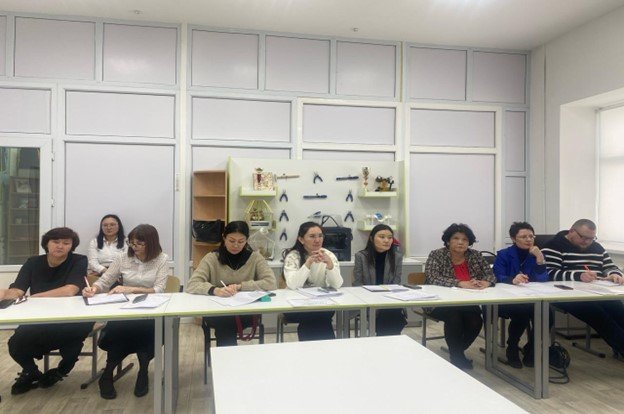5, 6, 12 и 13 февраля методисты и языковые эксперты МУИТ посетили школы в Астане и Шымкенте, участвующие в проекте по повышению грамотности детей. Основными целями визита экспертов в столичные школы и школы южного региона были: знакомство со школами, администрацией, учителями русского и английского языков, проведение опроса среди учителей по проекту Akelius (в электронном формате), предоставление оффлайн методических и технических консультаций, планирование онлайн-тренингов (темы, даты), работа над улучшением курса на платформе Akelius и др. Важно отметить, что эксперты спланировали и провели визиты в следующие школы Астаны: школа-гимназия №51, школа-лицей №53, школа №60, школа-лицей №62, школа №67 и школа №75. Наблюдение за уроками и живое общение позволили экспертам наметить дальнейший план по организации тренингов для учителей и созданию методических рекомендаций по оценке учащихся.
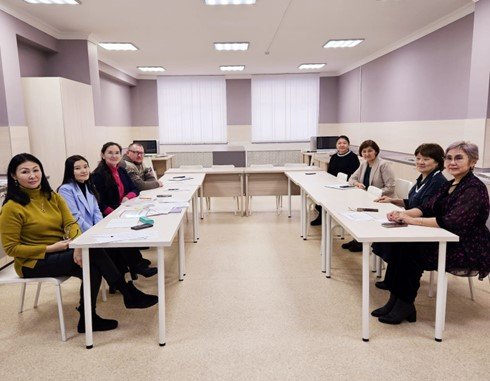
Динара Алиева, языковой эксперт МУИТ и доцент кафедры языков, отметила, что 2-й этап проекта Akelius проходит успешно. Об этом свидетельствует опыт учителей, которые переняли знания у педагогов, участвовавших в 1-м этапе проекта. По её словам, нет ощущения «проб и ошибок». Динара Асылхановна также подчеркнула, что все уроки учителей отличаются и интересны: каждый педагог стремится использовать разные инструменты для вовлечения учеников в учебный процесс, тем самым достигая общей цели обучения. Она считает, что успех в работе напрямую зависит от условий, в которых происходит рабочий процесс. По её мнению, учителя города Астаны успешно справляются со своими задачами, что, скорее всего, объясняется уровнем подготовки детей и педагогов, а также техническим оснащением школьных кабинетов.
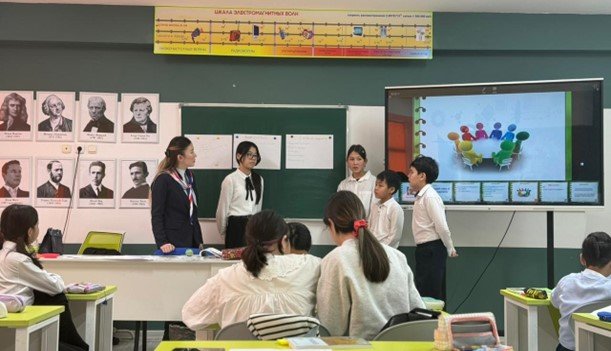
Динара Алиева также отметила ряд методических трудностей, замеченных в процессе наблюдения за уроками: часто во время занятий учителя привлекают к работе сильных учеников (что характерно для демонстрационных уроков). В некоторых классах отсутствует чёткая структура урока или плавный переход от одного вида деятельности к другому. В ряде случаев отсутствует творческий подход к использованию материалов Akelius: дети выполняют задания по отдельности, но учитель не проверяет и не комментирует их ответы.
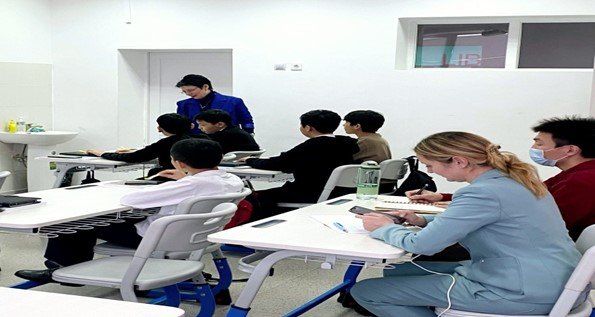
Оксана Бубликова, доцент кафедры языков, также отметила техническое оснащение столичных школ, особенно школы-лицея №62, которую они посетили в рамках поездки, а также профессиональную подготовку её преподавателей. По её мнению, в Астане действительно высокий уровень школ и учителей, которые активно участвуют в проекте и всегда нацелены на выполнение своих обязанностей и достижение результата.
Жаннура Манапбаева, координатор проекта АО «МУИТ», PhD и заведующая кафедрой языков, также поделилась своим мнением касательно оснащённости школ. Она отметила, что каждая школа оборудована всем необходимым, прежде всего — персональным компьютером и принтером. В большинстве школ есть места для отдыха учителей во время перемен. Тематически оформленные кабинеты способствуют более продуктивному учебному процессу. Она также упомянула школу №75, в которой созданы комфортные условия для работы с детьми.
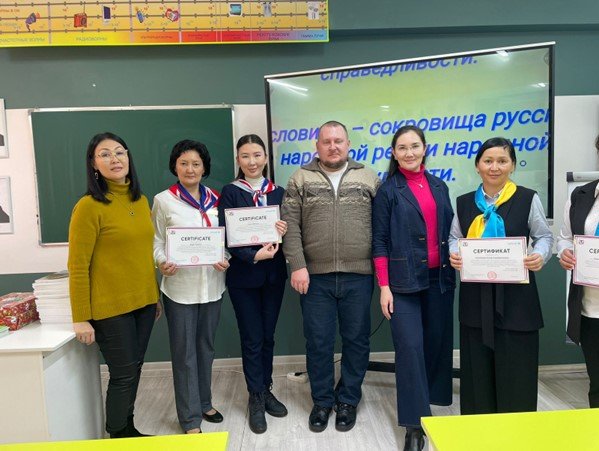
Евгений Медведев, кандидат филологических наук и старший преподаватель, поделился своими наблюдениями во время визитов в столичные школы. По его словам, все учителя используют Akelius на обычных, а не дополнительных занятиях (этот момент вызывал опасения в начале 2-го этапа: получится ли сочетать материалы основной программы с материалами Akelius). Однако большинство педагогов успешно справляются с этой задачей. При этом учителя отмечают, что планшеты вызывают интерес у детей, они не отвлекаются на другие гаджеты и активно участвуют в уроке. В школе №75 учителя используют планшеты для работы с детьми с ООП (особые образовательные потребности). Учителя в Астане всегда используют дескрипторы.
Также языковые эксперты посетили ряд школ в городе Шымкент, участвующих в проекте: средняя школа №39 им. М. Жумабаева, школа-гимназия №50 им. А. Байтурсынова, средняя школа №76 им. Р. Мирзашева, IT школа-лицей №80, средняя школа №86 и средняя школа №122. Ситуация в школах города Шымкент не сильно отличается от столичных.
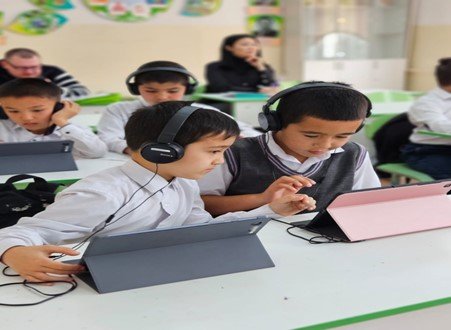
По мнению Динары Асылхановны, во время визита не было зафиксировано серьёзных технических затруднений. Все активно и эффективно используют планшеты, и самое главное — отсутствует зависимость от интернета, так как все необходимые материалы заранее загружены на планшеты. По её словам, в некоторых классах не хватает активных форм работы: дети делятся на группы по технологии «ротации станций», но при этом выполняют одинаковые задания.
Оксана Васильевна отметила, что, как и в Астане, учителя умело комбинируют задания из электронного учебника с материалами из приложения Akelius, а также активно используют индекс для поиска подходящих заданий. Заданий на общей интерактивной доске и совместного выполнения заданий из Akelius довольно много, что позволяет тренировать навыки аудирования.
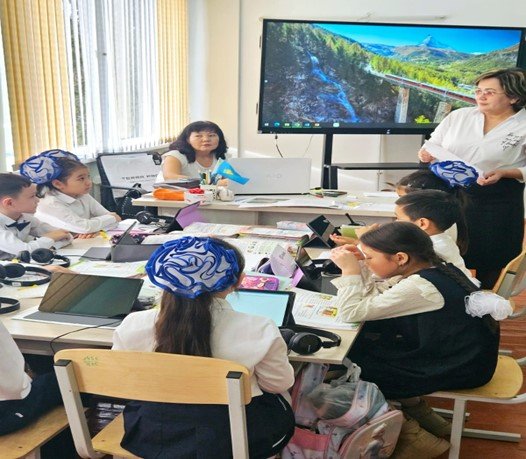
Жаннура Жарканбековна также поделилась своими наблюдениями, отметив следующее: «В школе №50 мы познакомились с учеником Жаксылык, который участвует в проекте уже второй год. Хочется отметить, что динамика заметна — сейчас он обучается на промежуточном уровне B».
Эксперты МУИТ дали соответствующие рекомендации по дальнейшей работе с платформой Akelius. Евгений Юрьевич сделал вывод о необходимости публикации методического пособия с разработками уроков, которое станет помощником для новых учителей, расширит педагогический кругозор, а также организации встреч учителей из разных регионов для обмена опытом, поскольку подходы преподавателей в трёх городах отличаются.
Во время визита в вышеуказанные школы эксперты не только присутствовали на уроках, но и провели опрос среди учителей по проекту Akelius. Также были проведены оффлайн методические и технические консультации, представлены методические материалы для эффективной реализации проекта и отмечено, что работа по улучшению курса на платформе Akelius будет продолжена. По завершении визита участникам были вручены сертификаты за пройденные тренинги.
